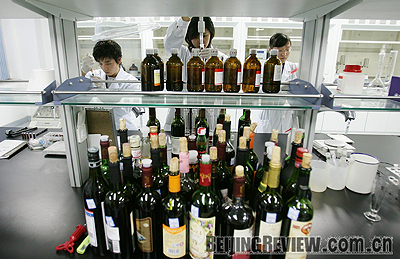|

QUALITY CONTROL: Staff work in a laboratory at the Beijing Municipal Center For Food Safety Monitoring. The center was created under the Beijing Food Safety Administration in 2004 to provide technical support for food safety at the 2008 Olympics
Baoshan, a small town in Huairou District where the average temperature is 3 to 4 degrees centigrade lower than in the urban area due to its elevation of more than 300 meters, is the site of Beijing's Olympic Tomato Base.
Although tomatoes are a summer vegetable, they have very strict temperature demands. Temperatures that are too high or too low will affect the flavor and color of the tomatoes.
Considering this, researchers at the Beijing Agro-Technical Extension and Service Center designed a special tomato shed. It has a plastic cover found on most vegetable sheds and also two layers of gauze covering, one black for shutting out sunlight and the other white for preventing pests.
"Technically, we can completely control the temperature for the growth of the tomatoes," said Si Lishan, Vice Director of the center. "But the cost of lowering the temperature is relatively high, so it is better to choose a mountainous area with a naturally lower temperature as a planting base for tomatoes."
"In order to keep the natural flavor of tomatoes and ensure their safety for people's health, we don't spray any pesticides on them," he added.
At present, vegetables in Beijing's markets are mainly targeted at Chinese consumers, but the city's Olympic guests will come from many different parts of the world. The Beijing Agro-Technical Extension and Service Center established experimental planting bases for more than 170 types of foreign vegetables in order to provide the visitors with a taste of home.
After initial research of more than three years, the center and related institutes picked several planting bases, most of which are within 300 km of Beijing to help ensure the freshness, quantity, safety and quality of the food.
All the seeds used to grow the Olympic vegetables are from Yanqing District in Beijing. Every Olympic vegetable, from the seed to the dinner table, is digitally recorded with very detailed information about its origin, fertilizer application and where it was processed. Finally, the vegetables are packed into categories and put into refrigerated rooms labeled with authentication codes.
| 